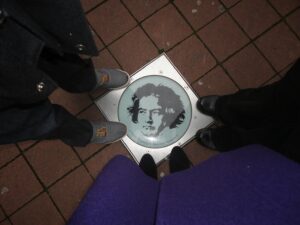
Street tile in Bonn, Germany (copyright: Leila Amineddoleh)
This month marks the 250th birthday of the legendary Ludwig van Beethoven. (There is no record of his actual birthdate, but his baptism on December 17, 1770 has led many to believe that he was born on December 16.) Recognized as one of the greatest figures in the world of classical music, his compositions are readily recognizable to people all over the world, including his dramatic Fifth Symphony, Fur Elise, the Second Movement of the Seventh Symphony (familiar to some from The King’s Speech), and the Ode to Joy from the final movement of his Ninth Symphony. Beethoven’s genius was instrumental in ushering in a new type of classical music, during a career that straddled the shift from the Classical to the Romantic era.
With his talent obvious from an early age, Beethoven began his musical career as a child. He was a virtuosic pianist and violinist, and clearly a talented composer. He gained fame during his lifetime, but also suffered the tragic loss of his hearing. However, his early life was not free from difficulty. He received harsh and intense musical training, often being dragged from bed in the middle of the night to practice the keyboard. By his late 20s, he began noticing difficulties with his hearing. By his mid-40s, he was totally deaf. Despite his medical condition, he persevered and continued to write staggeringly beautiful music that stirs audiences to this day.
As the writer of emotional and complex music, it is perhaps no surprise that he also wrote beautiful prose. He famously authored a celebrated love letter to a mysterious “Immortal Beloved.” The passionate letter was never sent to its intended recipient, whose identity is still a subject of debate. Beginning with “My angel, my all, my own self” and ending with “Ever thine. Ever mine. Ever ours,” the romantic missive has led to questions about the letter’s inspiration. (A translated copy of the letter can be found here.) Speculation about the woman’s identity inspired the film “Immortal Beloved,” whose theory of the identity is most certainly faulty. (Unfortunately, the film also represented Beethoven as a caricature of a tormented lothario and misunderstood artist.) A discussion about more probable candidates can be found here.

Amineddoleh & Associate’s founder at the Beethoven Haus
Besides the mystery surrounding the inspiration for the letter, its provenance is also interesting. The letter was written in pencil on 10 small pages, in the composer’s inconsistent handwriting. It was found in his estate after his death, and it remained with Anton Schindler, who had served as Beethoven’s secretary for a number of years, until his death. Unfortunately, Schindler was known to alter Beethoven’s personal documents and profited by plundering the composer’s legacy. Upon Schindler’s passing, the letter was bequeathed to Schindler’s sister, who in turn sold it in 1880 to the Berlin State Library. It remains there today. However, the date year of the writing was unclear until the mid-20th Century. An analysis of the paper’s watermark was completed in the 1950s, revealing that it was written on July 6-7, 1812 during a stay in Teplice, in the modern day Czech Republic. This is supported by a later letter by the composer to Rahel Varnhagen, suggesting that he had a meeting with his “Immortal Beloved” on July 3, 1812.
As with other famed composers and artists, forgeries of letters and manuscripts by Beethoven have cropped up over the years. Just four years ago, a purported manuscript by Beethoven failed to sell at Sotheby’s due to doubt cast upon its authenticity by musicologists and Beethoven scholars. One point of contention is the handwriting used in the manuscript; in particular, the notation of the natural sign. At Amineddoleh & Associates, we are proud to assist clients in authentication matters of all kinds, including documents and manuscripts, both musical and non-musical.
2020 was slated to be a year celebrating Beethoven’s birthday as one of the titans of the classical music world, with a calendar of performances and celebrations. Sadly, concertgoers were sorely disappointed as the events were cancelled due to COVID-19. However, in celebration of Beethoven’s staggering genius, WQXR (NY Public Radio) is currently hosting the program Immortal Beethoven. The station is available to listeners around the world. In addition, Beethoven Haus (the composer’s birthplace) in Bonn, Germany is hosting events for the composer this year. Due to the COVID-19 pandemic, the events are hosted online. For more information, visit the museum’s website. And for some lighter Beethoven entertainment, enjoy this clip from SNL.
Happy birthday Ludwig!